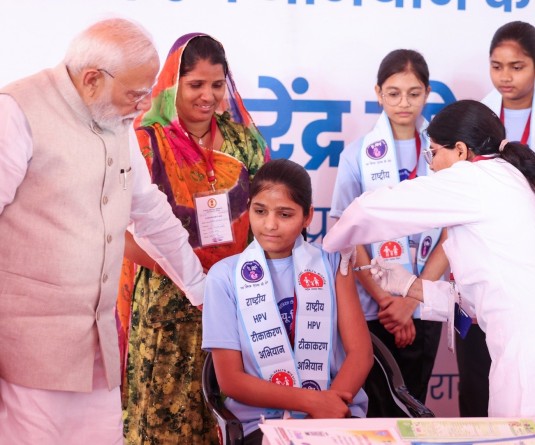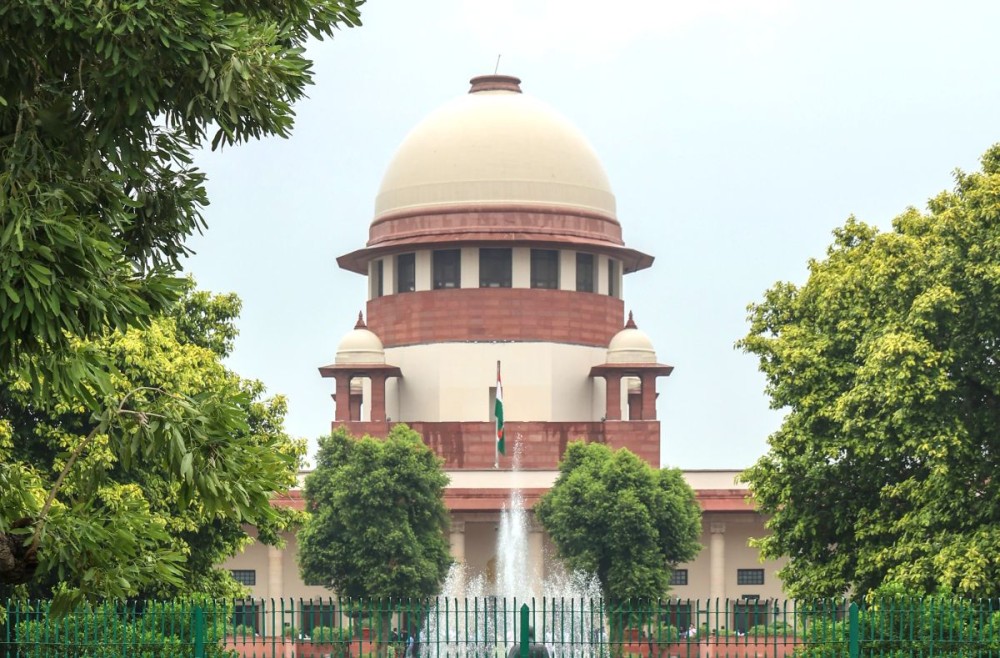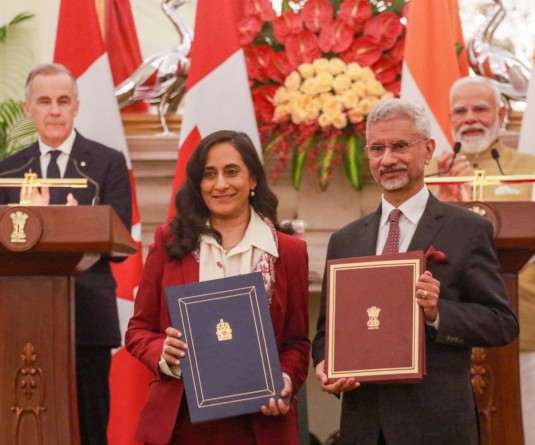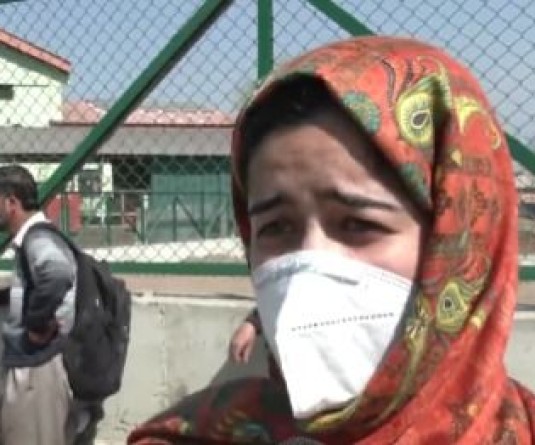
US Secretary of Homeland Security Janet Napolitano, left, and Indian Home Minister P. Chidambaram look on during a joint press conference in New Delhi, May 27. The United States and India have pledged to boost their efforts in counterterrorism, intelligence sharing and cybersecurity. (AP Photo)
New Delhi, May 27 (Agencies): Home Minister P Chidambaram today said that India lives in the “most difficult neighbourhood” in the world as terrorism infrastructure in Pakistan has flourished “as an instrument of state policy”. Calling for stronger Indo-US ties to combat terrorism and other threats, Chidambaram stressed on the need for a “stable, peaceful and prosperous neighbourhood” for the security of the people of India. “It is a truism to say that India lives in perhaps the most difficult neighbourhood in the world. The global epicentre of terrorism is in our immediate western neighbourhood.
“The vast infrastructure of terrorism in Pakistan has for long flourished as an instrument of state policy,” he said in his opening remarks at India-US Homeland Security Dialogue being held here. Terming terrorism as the “principal challenge” for both the countries, the Home Minister advocated the need to deal with a range of other challenges, including counterfeit currency, narcotics trafficking, threats and risks in cyber space. “Today, different terrorist groups, operating from the safe havens in Pakistan, are becoming increasingly fused. The society in Pakistan has become increasingly radicalised. Its economy has weakened and the state structure in Pakistan has become fragile.
“Given the complexity of our region, our government has a comprehensive neighbourhood strategy that is based on political engagement, especially with Pakistan, support for political stability, assistance for economic development and improved connectivity and market access for our neighbours to the Indian economy,” Chidambaram said. “A stable, peaceful and prosperous neighbourhood is vital for the security of the people of India,” he said. During the bilateral dialogue with his American counterpart Janet Napolitano, Chidambaram said, “A strong and effective India-US cooperation in homeland security and counterterrorism is indispensable for our strategic partnership.
“One of the key elements of the India-US relationship is our engagement on the issue of terrorism and on counter-terrorism cooperation. Dealing with the challenge of terrorism is a priority for the people of India. There has always been great public and political expectation about India-US cooperation on counterterrorism. “This is because of our shared values, the growth of strategic partnership between our two countries, US expertise and capabilities, and the perception in India that the United States exercises a strong influence on the country that is the hub of global terror,” the Home Minister said. Chidambaram also appreciated the US efforts to bring the perpetrators of Mumbai terror attack, and others associated with it, to justice.
“Our cooperation must cover all aspects of the challenges that we face (by) anticipating and predicting threats, taking preventive or pre-emptive measures, or responding effectively and quickly to incidents. “Therefore, we must further deepen our ties in intelligence, information and assessment sharing, cooperation in investigations and forensics, protecting cities, infrastructure, people and trade and developing capabilities,” he said. The Home Minister proposed a meeting between Home Secretary and the US Deputy Secretary for Homeland Security after six months to review progress.
“The vast infrastructure of terrorism in Pakistan has for long flourished as an instrument of state policy,” he said in his opening remarks at India-US Homeland Security Dialogue being held here. Terming terrorism as the “principal challenge” for both the countries, the Home Minister advocated the need to deal with a range of other challenges, including counterfeit currency, narcotics trafficking, threats and risks in cyber space. “Today, different terrorist groups, operating from the safe havens in Pakistan, are becoming increasingly fused. The society in Pakistan has become increasingly radicalised. Its economy has weakened and the state structure in Pakistan has become fragile.
“Given the complexity of our region, our government has a comprehensive neighbourhood strategy that is based on political engagement, especially with Pakistan, support for political stability, assistance for economic development and improved connectivity and market access for our neighbours to the Indian economy,” Chidambaram said. “A stable, peaceful and prosperous neighbourhood is vital for the security of the people of India,” he said. During the bilateral dialogue with his American counterpart Janet Napolitano, Chidambaram said, “A strong and effective India-US cooperation in homeland security and counterterrorism is indispensable for our strategic partnership.
“One of the key elements of the India-US relationship is our engagement on the issue of terrorism and on counter-terrorism cooperation. Dealing with the challenge of terrorism is a priority for the people of India. There has always been great public and political expectation about India-US cooperation on counterterrorism. “This is because of our shared values, the growth of strategic partnership between our two countries, US expertise and capabilities, and the perception in India that the United States exercises a strong influence on the country that is the hub of global terror,” the Home Minister said. Chidambaram also appreciated the US efforts to bring the perpetrators of Mumbai terror attack, and others associated with it, to justice.
“Our cooperation must cover all aspects of the challenges that we face (by) anticipating and predicting threats, taking preventive or pre-emptive measures, or responding effectively and quickly to incidents. “Therefore, we must further deepen our ties in intelligence, information and assessment sharing, cooperation in investigations and forensics, protecting cities, infrastructure, people and trade and developing capabilities,” he said. The Home Minister proposed a meeting between Home Secretary and the US Deputy Secretary for Homeland Security after six months to review progress.
US assures more access to David Headley
NEW Delhi, may 27 (agencies): US Secretary of Homeland Security Janet Napolitano Friday refused to comment on the involvement of Pakistan’s ISI spy agency in the 2008 Mumbai terror attack as alleged by key conspirator David Coleman Headley. But the visiting American official assured India of more “access” to Headley, who has admitted his role in the Mumbai attack and turned into a witness against co-accused Tahawwur Rana. The two had helped the Lashkar-e-Taiba plan the attack that left 166 people, including six Americans, dead in November 2008.
“Well I would suggest that we are here to talk about the strategic partnership and the United States,” Napolitano said at a joint press conference with her Indian counterpart P. Chidambaram when asked to comment on Headley’s revelations that Pakistan’s Inter-Services Intelligence was behind the Mumbai attack conspiracy. Asked if the US would use its influence on Pakistan to build pressure on that country for the prosecution of LeT chief Haafiz Sayeed, who is believed to have masterminded the Mumbai attack, the US official again declined to comment on what Pakistan should do. “Secretary of State (Hillary Clinton) is in Pakistan today and I leave the comments about Pakistan for her. She will make some comment,” she said.
Napolitano was in New Delhi for the first India-US homeland security dialogue aimed at enhancing anti-terror cooperation between the two countries. She said on the first day of her four-day trip to India, she went to Mumbai “so that I could walk through, learning details about the 26/11 attack”. “The case is going on in Chicago... The US has given India full access to the witness and when the case is over there will probably be more access given. When the case is on it is not appropriate to comment on what happened there,” she said, declining to even comment on how the US views the Headley revelations. She said the India-US strategic ties were going and the “fact is that we share and have shared that strategic partnership for many years. That partnership is going to, I think, only intensify in the months and years to come”.
“Well I would suggest that we are here to talk about the strategic partnership and the United States,” Napolitano said at a joint press conference with her Indian counterpart P. Chidambaram when asked to comment on Headley’s revelations that Pakistan’s Inter-Services Intelligence was behind the Mumbai attack conspiracy. Asked if the US would use its influence on Pakistan to build pressure on that country for the prosecution of LeT chief Haafiz Sayeed, who is believed to have masterminded the Mumbai attack, the US official again declined to comment on what Pakistan should do. “Secretary of State (Hillary Clinton) is in Pakistan today and I leave the comments about Pakistan for her. She will make some comment,” she said.
Napolitano was in New Delhi for the first India-US homeland security dialogue aimed at enhancing anti-terror cooperation between the two countries. She said on the first day of her four-day trip to India, she went to Mumbai “so that I could walk through, learning details about the 26/11 attack”. “The case is going on in Chicago... The US has given India full access to the witness and when the case is over there will probably be more access given. When the case is on it is not appropriate to comment on what happened there,” she said, declining to even comment on how the US views the Headley revelations. She said the India-US strategic ties were going and the “fact is that we share and have shared that strategic partnership for many years. That partnership is going to, I think, only intensify in the months and years to come”.






